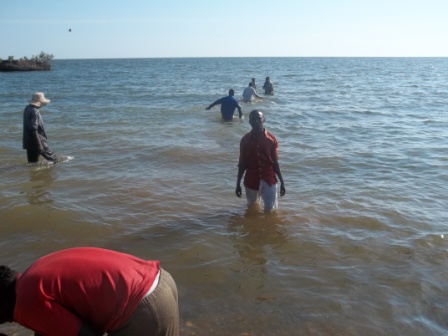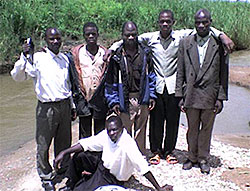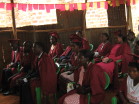 
Evangelism
Report of the Director of Evangelism, July 2007
Greetings in the matchless name of Jesus! This will be my last report, as I am resigning from as director of the board of evangelism for the Pacific Conference. I have enjoyed working with many of you over the past several years, both as a member of the board, as well as the director for two years.
I stated last year that we need to develop new evangelistic strategies, due to the changes in the cultures and sub-cultures that we live and work in. I am now more than ever in my life one who does not believe in sugar-coating reality. We often rejoice in minor victories, while at the same time ignore major defeats. We live in a nation in which we as Bible believing Christians have lost the ear of seventy to eighty percent of the rest of the population. They do not know us, and for various reasons are at the best ambivalent to us, and at the worst, hostile. I still believe that it is essential for us to be open to the Holy Spirit as He challenges with fresh ways to reach those who do not yet know Jesus Christ as Savior and Master. At the same time, I also believe that evangelism goes to the core of who we are, and is not just something we "do." It begins with a passion for Jesus Himself, and develops into receiving the passion that He has for those who do not yet know Him. The follower of Jesus Christ desires to help Him establish His kingdom on earth now, and is not content to wait until His glorious appearing.

For my outgoing exhortation, I would like to make two recommendations. First, we as individual believers must take seriously the truth that Christians are to be first of all followers of Jesus Christ. This means that we are to work with the Holy Spirit moment-by-moment to "be transformed by the renewing of our mind (Romans 12:1)" in all areas of our lives, seven days a week. There are many excellent speakers and writers who address this point; I would like to recommend for your consideration the book, The Divine Conspiracy, by Dallas Willard. Dallas is a philosopher, so you may need to do some sifting and re-reading. You will also want to do more than just "read through" this book. Dallas proposes a paradigm shift in the way that we look at disciples and disciple-making. He uses a major part of his volume to address the sermon on the mount, proposing that Jesus was speaking in a descriptive manner, not a prescriptive one. In other words, Jesus is speaking about what kingdom character looks like as it is lived out in behavior. He also makes some recommendations as to how we are to look at becoming and making disciples. He believes (I whole-heartedly agree with him) that disciples will reproduce other disciples. What we are speaks far louder than what we say, never more true than today! Our culture is turned off to people who claim one thing and live another. If we want people to listen to what we say, we have to earn that right by living in integrity in all that we say and do, and not just on Sundays! Dallas proposes a lifestyle that will model Christ-like behavior and will be winsome to those around us.

Second, local churches are corporately the body of Christ. As such, who we are is the gospel that our community observes. Just as healthy individual believers will win the hearts of people to Christ through their modeling of personal kingdom living, the body of Christ will win people through its modeling of a healthy family of the Kingdom of Jesus Christ. When we are a healthy church body, people see the love we have for each other, as well as the manner in which we cooperate together and reach out to our community as a family of believers. People long to be a part of a vibrant, active group of people who enjoy each other and enjoy life together, making a difference in the world in which they live. Healthy churches produce new believers! One of the best ideas in recent years for promoting health in a church is Christian Schwartz's, "Natural Church Development. Many of us have heard of NCD already, and churches in the Pacific Conference will receive opportunities to become familiar with it from now on. Natural Church Development operates under a statistically proven concept that healthy churches naturally produce new believers (hence the term Natural Church Development). The NCD process is based upon a proven theory that there are eight quality characteristics in a healthy church, and six growth principles which help bring about these qualities. The eight characteristics are valid across all cultures and in all places. They are based upon scriptural truths and have been proven over and over in Schwartz's extensive research. There are several tools available to help a church increase in overall health. These tools focus on the eight quality characteristics and the six growth principles (which apply to all organisms and produce "all by itself growth"), and are fairly easy to work understand and with. Schwartz and his team have proven that if a church works on the quality that it needs the most help with (the "minimal factor"), the overall health of the church increases. This in turn will bring people into the kingdom. What we are determines how people see the gospel. NCD helps a church to live as the body of Christ. Don Hohensee and Jack O'Neill have been trained in NCD. They would be happy to present the basics of NCD to your church.

|